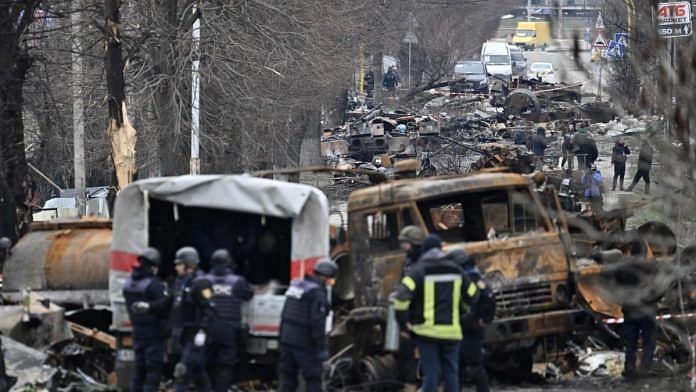Thank you dear subscribers, we are overwhelmed with your response.
Your Turn is a unique section from ThePrint featuring points of view from its subscribers. If you are a subscriber, have a point of view, please send it to us. If not, do subscribe here: https://theprint.in/
The alleged killings in Bucha have lit the tinder for a far widespread debate on the roles of different countries in the ongoing Ukraine -Russia conflict both nationally and internationally. At the same time, another concerning news has hit us. The WHO has reported rising violent attacks on healthcare sector in Ukraine and has called for an immediate de-escalation of the same. An uncomfortable question may be raised here. Do destroyed healthcare infrastructures, reported causalities of the care providers and care seekers evoke same emotion in us anymore as does the horrific images from Bucha?
Surely, images of indiscriminate killings of civilians; some with hands bound behind their back, their bodies strewn on roads used to hustle – bustle or the quiet of not-so-distant normal days, evoke strong emotion. These are pictures that tells of possible war crimes but so does a picture of a destroyed hospital infrastructure or a hapless patient getting killed while trying to escape on his/her own. These are the most vulnerable of our population and the most selfless among us. Entrusted with upholding the ethics and laws of Medical Impartiality; healthcare workers are getting killed directly or as collaterals. Inspite of the fog of war, it is not difficult to see countries engaged in armed conflicts are increasingly using targeting healthcare infrastructure as strategic objectives. In a piece published in BBC, Neve Gordon, professor of international law and human rights at Queen Mary University of London, said: “What we have today, in effect, is a situation where hospitals and medical units have become fair game.”
Evidence can be sought on this regard from books and scientific literatures. In a piece published in the Lancet1, “The healer as the enemy, attacking healthcare in war” the writer writes about a book ‘Perilous Medicine’ where Leonard Rubenstein working in a leadership position for Physicians for Human Rights has chronicled his experiences in the form of case studies. In a systematic analysis published in BMC2, the researchers Rohini J Haar et al have identified healthcare infrastructure destruction as the most common mode of attacks on healthcare in conflict zones. The study also finds, attacks on transport, denying healthcare service and direct attack on health personnel as some common modes used by perpetrators. What is unmistakably noticeable from the evidence is the fact that there is no good or evil in these acts and one must refrain from getting into the who did what narrative as we seek solutions of the crisis.
As the Ukrainian crisis moves on to being an attritional war, one humongous threat facing it internally is its healthcare services on brink of collapse as WHO puts in. Ad-hoc measures, international help, and an immediate de-escalation of attacks on healthcare can only save Ukraine from this humanitarian disaster. But de-escalation seems to be a pipe dream right now with reactions around the world somewhat muted on the matter of healthcare attacks. The US has warned Russia against using chemical weapons in the war threatening it with retribution. The spectre of nuclear holocaust is very much alive in the collective psyche of the people around the world as well as the world leaders; yet with respect to healthcare attacks, we seem to have grown some thick skin. International community has rarely delivered in getting the perpetrators of attacks to book. One of the main reasons for this loophole in spite of Geneva convention declaring healthcare attacks as an act of “war crime” is in the law itself. The law offers the perpetrators an escape route by creating exceptions to its rule instead of a blanket ban on these acts. Consensus among all stakeholders and mechanisms need to be built urgently in this regard and a blanket ban needs to be in effect. The public discourse also needs to be as strong as has been with the incidents of Bucha. The mental element of war crime needs to be restructured. Often healthcare infrastructures are being bombed from bombers or from missiles from far off giving the perpetrators enough wriggle room to escape guilt. We need to rebuild it. Alternative healthcare delivery model like telemedicine care needs to be activated and integrated in emergency healthcare response model. To avoid deliberate attacks, non-identifying the healthcare provisions can be an option as well. Big hospitals in strategic locations may need to build designated bomb shelters, in the context of escalating conflicts around the world. More research needs to be done involving stakeholders – identifying perpetrator motivation can be a priority.
Countries cannot afford to sit idle on the present context. India and other countries must come strong on condemning healthcare attacks like it has for Bucha killings and prepare for any eventuality considering how reckless countries has become in present times with respect to waging war.
These pieces are being published as they have been received – they have not been edited/fact-checked by ThePrint.
Also read: Can Bucha killings be called ‘genocide’? This is what international law says

